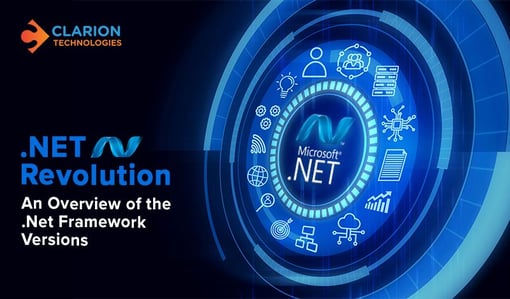Navigating the .NET Universe: Know the latest .NET Framework Versions and Support.
Among many programming languages and frameworks, .NET Framework versions stands out for their versatility and robustness. Developed by Microsoft, .NET Framework is one of the .NET latest versions that provides a platform for building various applications. It helps develop web and desktop to mobile and cloud-based solutions.
The Common Language Runtime (CLR), a crucial component within the Microsoft .NET Framework, oversees the execution of programs developed in the .NET environment. .NET is a versatile and robust cross-platform framework. It offers .NET software development services with an ecosystem for diverse application development. It supports languages like C#, F#, and Visual Basic. It provides a unified and adaptable solution for businesses. It offers scalable, secure, and innovative software solutions.
The .NET Framework versions are an evolving developer platform, offering developers various choices with different versions. Let us proceed with the journey of .NET framework versions and their features. Businesses avail .NET software development services to leverage .NET's benefits for software development.
Key Points:
- Cross-Platform Excellence: .NET, a developer platform, enables applications to run seamlessly on Windows, macOS, and Linux.
- Language Diversity: Developers from a DOT NET development company can choose from C#, F#, and Visual Basic for code writing.
- Shared Ecosystem: Using your preferred programming language, benefit from a unified .NET ecosystem.
- Cloud Integration: Integration with cloud services enhances scalability and flexibility.
- Robust Security: NET's strong security features ensure the development of secure applications.
- Continuous Updates: Regular updates keep the DOT NET framework current and aligned with evolving industry standards.
Features of .NET framework:
-
Common Language Runtime (CLR): Provides a runtime environment for executing and managing .NET applications.
-
Base Class Library (BCL): .NET versions offer a comprehensive set of reusable classes and functions, simplifying development tasks.
-
Language Interoperability: Supports multiple programming languages like C#, VB.NET, and F# to work seamlessly within the same application.
-
ASP.NET: Enables building dynamic web applications and services, facilitating robust and scalable web development.
-
Security and Memory Management: .NET Framework versions incorporate built-in security mechanisms and automatic memory management through garbage collection for enhanced application reliability.
Different .NET Framework Versions and Features:
Here's the history of .NET Framework versions with their release date:

- The first version of .NET Framework 1.0 was released in February 2002.
- .NET Framework 2.0: Released in November 2005.
- .NET Framework 3.0: Released in November 2006.
- .NET Framework 4.0: Released in April 2010.
- .NET Framework 4.5: Released in 2012.
- .NET Framework 4.5.1: Released on October 17, 2013.
- .NET Framework 4.5.2: Released on May 5, 2014.
- .NET Framework 4.6: Released in July 2015.
- .NET Framework 4.6.1 Released on November 30, 2015.
- .NET Framework 4.6.2 Released on August 2, 2016.
- .NET Framework 4.7 was released in May 2017.
- .NET Framework 4.7.1 was released on October 17, 2017
- .NET Framework 4.7.2 was released on April 30, 2018
- .NET Framework 4.8 was released in April 2019.
- .NET Framework 5.0: Released in November 2020 (Note: This marks the convergence of .NET Core and .NET Framework into a single, unified platform).
- .NET Framework 6.0: Released in November 2021.
- .NET Framework 7.0: Released in November 2022.
- .NET Framework 8.0: The latest version, released in November 2023.
.NET Framework 8.0 - Embracing Long-Term Support (LTS):
At the forefront of the .NET universe is version 8.0, the latest Long-Term Support (LTS) release. LTS versions ensure a stable and supported environment for an extended period. Supported for three years, .NET 8.0 promises continuous updates to enhance functionality. It addresses security vulnerabilities until November 10, 2026.
Features of NET Framework 8.0
.NET Framework 8.0 introduces advanced cross-platform and cloud-native support, minimal APIs for streamlined development, enhanced containerization, and improved language features like source generators, emphasizing performance and productivity for modern .NET software development services.
- Release Type: Long-Term Support
- Support Phase: Active
- Latest Release: 8.0.0
- Latest Release Date: November 14, 2023
- End of Support: November 10, 2026
Know which are the top .NET development companies for innovative software development.
.NET Framework 7.0 - The Standard Term Adventure:
Venturing into the .NET developer platform universe, we encounter .NET Framework version 7.0, characterized by Standard Term Support (STS). STS releases offer a shorter support period of 18 months. It makes them an exciting choice for DOT NET development company developers eager to explore the latest features and innovations. The maintenance support period of this version of DOT NET focuses on security updates and lasts six months before end-of-life.
Features of .NET Framework 7.0
.NET Framework 7.0 introduces improved MAUI support for cross-platform app development, boosts performance with JIT compilation enhancements, adds new language features like record structs, and emphasizes open-source collaboration for a more efficient and modern development experience.
- Release Type: Standard Term Support
- Support Phase: Maintenance
- Latest Release: 7.0.14
- Latest Release Date: November 14, 2023
- End of Support: May 14, 2024
.NET Framework 6.0 - Sailing the Seas of Long-Term Support:
The .NET Framework 6.0 version emerges as another beacon of stability with Long-Term Support. Active support improves both functionality and security in cross-platform development. Developers of a DOT NET development company can rely on version 6.0 until November 12, 2024.
Features of .NET Framework 6.0
- Release Type: Long-Term Support
- Support Phase: Active
- Latest Release: 6.0.25
- Latest Release Date: November 14, 2023
- End of Support: November 12, 2024
.NET Framework 5.0 -
.NET 5 offered support for various types of applications. This update improved code efficiency with introduction to C#, F#, Visual Basic that have increased capabilities. Garbage collection, regular expression, json processing, app trimming, single file apps, improved development experience and platform compatibility.
Features of .NET Framework 5.0
- Performance enhancements
- Language Updates
- Expanded platform support
- Enhanced Deployment options
- New System.Text.Jason feature
.NET Framework 4.0 -
It built the base for introducing advanced features like task parallel library, parallel programming, dynamic language runtime etc. It helps enhancing scalability and performance. .Net 4 version improved their Windows Presentation Foundation (WPF), Windows Workflow Foundation (WWF), Windows Communication Foundation (WCF). It helps build powerful UI, execute workflows, and offer service-oriented architecture.
Features of .NET Framework 4.0 -
- Improved garbage collection
- Dynamic language run-time
- WCF improvements
- WPF enhancements
.NET Framework 3.0:
- CLR Version: 2.0
- IDE Released: Visual Studio .Net 2005
Microsoft .Net Framework 3.0 embraced rich GUI capabilities that ensured a user-friendly way of communication with the users. It serves as the managed programming model as it comprises new sets of managed code APIs, which are an integral part of Windows Server 2008 and Windows Vista. The four core components included in this version are as follows:
- Windows Presentation Foundation (WPF): This component is mainly used for rich client applications and web application windows. It employs the Extended Application Markup Language (XAML) to build a rich user interface. This component supports to apply hardware accelerated and 2D & 3D graphics effects.
- Windows Communication Foundation (WCF) – This component aims to develop service-oriented applications – the distributed applications that run between servers and clients. It was formerly known as Indigo.
- Windows Workflow Foundations (WWF)– It provides an API, a rehostable designer and an in-process workflow engine to implement the process as workflow within your .NET apps.
- Windows CardSpace – This component aids users to manage as well as control their personal information. It is client software intends to aid users in the web service or website authentication by offering a digital identity in a secure, trusted and simple way.
Other Features of .NET Framework 3.0
- Implicit Typed local variable
- Object and Collection Initializers
- Extension Methods
- Implicitly Typed Arrays
- Lambda Expressions
- Anonymous Types
- Auto-Implemented
.NET Framework 3.5
- CLR Version: 2.0
- IDE Released: Visual Studio .NET 2008
The .NET Framework 3.5 is the next incarnation of the Windows programming environment. Extending its predecessor .NET 3.0, version 3.5 goal is to aid the building of modern applications. .NET Framework 3.5 comprises some useful additions that affect several areas of version 3.0. For instance – there are notable enhancements in WCF, WPF, and WF. In addition, ASP.Net received Ajax support, and LINQ (Language –Integrated Query) become accessible to ADO.Net. Moreover, base class library encompassed various additions like unordered gatherings of unique elements and enhanced encryption support. The version 3.5 runs only on Windows Server 2003, Windows Server 2008, Windows XP and Windows Vista.
Other additional features of .NET Framework 3.5
- NET Ajax-enabled Websites
- ThreadPool Performance Enhancement
- LatencyMode in Garbage Collection
- TimeZoneInfo
- Cryptography Enhancements
- Socket Performance Enhancements
- Peer-to-peer networking
- Web Service Interoperability
.NET Framework 2.0
- CLR Version: 2.0
- IDE Released: Visual Studio .NET 2005
After the success of .NET Framework 1.1, Microsoft released the compact version of the framework and named as .NET Framework 3.0. This version focuses primarily on increasing the developer’s productivity. The version was updated with new features in ADO.NET like asynchronous database operations, XML data types, user-defined types (UDT), and snapshot isolation. In addition, it includes significant advancements in all areas of ASP.Net like new data controls, enhanced code-behind model, caching features and many more.
Features of .NET Framework 2.0:
- Enhancements to ASP.Net & ADO.Net
- Authenticated Stream
- Trace Data Filtering
- I/O enhancement
- Access Control List Support
- Data Protection APIs
- Programmatic control of caching
- EventLog Enhancement
- Console Class addition
- FTP Support
- Generics & Generic Collection
- Serialization
.NET Framework 1.0
- CLR Version: 1.0
- IDE Released: Visual Studio .NET
The .NET 1.0 is the first version of .NET Framework and includes everything you require to run the .NET Framework applications. It includes the CLR, Class Library and ASP.Net.
Features of .NET Framework 1.0:
- Introduced CLR 1.0
- Use of DLL class Libraries
- Support for Object-oriented web app development
.NET Framework 1.1
- CLR Version: 1.1
- IDE Released: Visual Studio .NET 2003
.Net Framework version 1.1 is the first major upgrade from its earlier version. This version comes with ASP.Net mobile controls that support mobile device development. It also includes ADO.net classes that aid communication using Oracle Databases and Database Connectivity (ODBC). This release has fixed some security issues discovered in the .NET Framework 1.0 and ensuring the code access security in your ASP.Net apps. It offers support for IPv6.
Features of .NET Framework 1.1:
- Enhanced features with ADO.Net and ASP.Net
- Security Enhancement along with secure coding guideline
- Support for IPv6
- Built-in support for databases and ODBC
Choosing the Right .NET Version:
In the diverse .NET ecosystem, the .NET framework version choice depends on your project's specific needs and goals. Long-Term Support releases offer stability and extended support. It's suitable for enterprise-level applications focusing on reliability. Standard Term Support releases are perfect for those who want cutting-edge features. But they need to adapt to more frequent updates.
Developers must align their project requirements with the support lifecycle of each .NET version. .NET – the developer platform ensures a rich development experience for programmers navigating the vast technology universe.
Overview with Use Cases to Highlight How the Latest Versions Of .NET Can Benefit Businesses.
Businesses seek ways to enhance their operations. One powerful tool in the arsenal of modern businesses is the .NET framework, developed by Microsoft. With each new version, .NET brings a host of features and improvements that cater to the evolving needs of businesses.
Latest versions of .NET Framework and the advantages they can offer:
Here's a simplified table comparing the use of .NET for mid-sized, small, and large enterprises:
|
Feature |
Mid-Sized Enterprises |
Small Enterprises |
Large Enterprises |
|
Scalability |
Easily scalable for growth |
Adaptable to changing needs |
Handles complex demands |
|
Cost-Effectiveness |
Balanced cost-to-benefit ratio |
Budget-friendly development |
Efficient resource utilization |
|
Integration Capabilities |
Seamless integration options |
Easily integrates with tools |
Robust integration support |
|
Developer Productivity |
Enhances development speed |
Streamlines development tasks |
Supports large teams |
|
Security Features |
Strong security protocols |
Sufficient for basic needs |
Comprehensive security measures |
|
Flexibility |
Adaptable to diverse needs |
Suitable for specific tasks |
Accommodates diverse requirements |
|
Cloud Readiness |
Well-integrated with cloud services |
Suited for cloud migration |
Optimized for cloud environments |
|
Community Support |
Active community contributions |
Supportive developer platform community |
Enterprise-level support |
|
Customization |
Easily customizable solutions |
Tailored to specific needs |
Supports intricate customization |
|
Long-Term Support |
Reliable long-term support |
May rely on community support |
1. Improved Performance and Scalability:
The latest .NET versions enhance performance and scalability. The latest versions contribute to faster business applications with high traffic and workloads. You can also create and run a .NET console application using Visual Studio Code.
Use Case: Imagine an e-commerce platform experiencing a surge in traffic during a flash sale. With .NET 8.0, the platform can handle the increased load, ensuring a smooth shopping experience for users.
2. Enhanced Security Features:
Security is a paramount concern for businesses in an era of increasing cyber threats. The latest .NET versions have security features and regular updates to address vulnerabilities. It provides a robust defense against potential breaches.
Use Case: For data integrity, e.g., a banking application built on .NET 8.0 can benefit from enhanced security protocols. This ensures that sensitive customer information is safeguarded. It maintains trust and compliance with industry regulations with code written.
3. Cross-Platform Development:
The latest versions of .NET promote cross-platform development. It enables businesses to reach a wider audience by deploying apps on multiple operating systems. This flexibility is precious for companies targeting diverse desktop, mobile, and cloud user bases. Visual Studio Code supports .NET Core, the cross-platform, open-source version of the .NET framework.
Use Case: Consider a healthcare organization developing a patient management system. With .NET 6.0's cross-platform capabilities, the system can be seamlessly deployed across Windows, macOS, and Linux. It allows medical professionals to access patient records from various devices.
4. Containerization and Microservices:
Containerization and microservices architecture have become vital trends. The latest .NET versions offer enhanced support for containerization. It enables businesses to build, deploy, and scale applications efficiently.
Use Case: A shipping company may use .NET Framework 7.0 to containerize its tracking and inventory management. This approach facilitates easy scaling and maintenance of individual microservices. It optimizes the overall logistics operation.
5. Cloud Integration and Serverless Computing:
Businesses increasingly adopt cloud technologies and serverless computing. It helps to achieve cost-effectiveness and scalability. The latest .NET versions with common language runtime CLR seamlessly integrate with popular cloud platforms. It allows businesses to harness the benefits of serverless architectures. Developers can use Visual Studio Code with .Net for its speed and efficiency.
Use Case: Imagine a media streaming service utilizing .NET 6.0. They can develop serverless functions for processing user requests and managing content distribution. This ensures cost efficiency and enables automatic scaling based on demand.
6. AI and Machine Learning Integration:
.NET with artificial intelligence (AI) and machine learning (ML) has opened up new business possibilities. The latest versions of .NET provide enhanced support for AI and ML frameworks. It enables the development of intelligent cross-platform applications.
Use Case: In the retail sector, ML algorithms with .NET 8.0 e-commerce platform can analyze user preferences. It offers personalized product recommendations, enhancing the shopping experience.
7. Developer Productivity:
The latest .NET versions come with improvements in developer tools, language features, and frameworks. It contributes to increased developer productivity. This, in turn, enables businesses to accelerate the development cycle. It brings innovative solutions to the market more rapidly. Developers use Visual Studio Code, which integrates with version control systems like Git, enabling developers to manage source code.
Use Case: Adopting .NET 7.0's and language features can lead to faster development cycles. Skilled .net Developers can write, test, and debug code written more efficiently. It reduces the time to market for new software products.
Understanding the differences between .NET versions is key to making an informed decision for your business. Want to know how this investment will impact your ROI? Try our. NET development company’s ROI Calculator to assess the potential returns of implementing .NET in your development projects.
Conclusion:
In the ever-expanding universe of .NET, each version tells a unique story. The future of .NET shines brightly in software development. Developers have many choices, from the stability of Long-Term Support to Standard Term adventures. Understanding the characteristics of each version allows developers to make informed decisions. It ensures that their projects thrive in the dynamic landscape of technology. The right choice is the one that aligns with your project's goals and ambitions. It guides you through the cosmos of coding with confidence.
The latest .NET framework versions emerge as a powerful ally for businesses. .NET, with common language runtime CLR, equips businesses with the tools needed to thrive in an ever-evolving digital landscape. It helps improve performance, security, cross-platform capabilities, and technology integration. The diverse applications of .NET across industries showcase its adaptability and relevance. With .NET, businesses can position themselves at the forefront of technological advancement. Want to hire .NET developers? Ready to meet the challenges and opportunities of the future? Connect with our experts to get started right away!
Frequently Asked Questions
-
What are the key components of .NET development framework?
TThe fundamental building blocks are the Common Language Runtime (CLR), the Base Class Library (BCL), ASP.NET for web development, ADO.NET for database access, Windows Presentation Foundation (WPF) GUI and other frameworks used like Visual Studio for coding.
-
How does .NET integrate with AI and machine learning?
.NET has AI/ML support built-in via ML.NET and expanded integration with TensorFlow and ONNX and is capable of integrating Python libraries so it can be developed with those as well.
-
What is the latest version of .NET framework?
The .NET latest version is .NET 8, which came out in November 2023, and it provides better performance, enhanced cloud-native features, and enhanced platform support.
-
Why is .NET a good choice for small, mid-sized, and large enterprises?
It has all the features that make it scalable, secure, and cross-platform with a rich set of libraries that had community support and Microsoft support for extended support and use with anything from web applications to microservices.
-
What is the future of .NET development framework?
The future is in and with cloud first, AI machine learning-first, and cross-platform, it will continue on a path of improving performance and support for greater interoperability with modern technologies, and offered from Microsoft for extended support.
Author





%201.png?width=3840&height=1000&name=MicrosoftTeams-image%20(58)%201.png)
.jpg?width=375&height=240&name=Top%20Reasons%20ASP.NET%20Core%20is%20the%20Best%20Framework%20for%20Web%20App%20Development%20(1).jpg)

